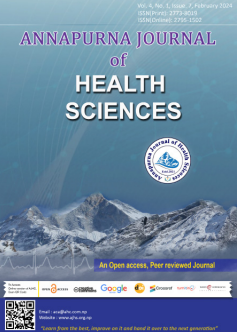Work Life Balance among Medical Doctors of Selected Teaching Hospitals of Kathmandu
Keywords:
Medical doctors, Teaching hospital, Work-life BalanceAbstract
Introduction: Work-life balance among doctors impacts personal and professional growth, patient care, and hospital performance. Since there are noticeably few studies assessing the same, this study aims to assess the work-life balance among medical doctors working in selected teaching hospitals of Kathmandu.
Methods: A cross-sectional descriptive study was conducted among medical doctors in Nepal, involving 372 participants. Self-administered survey questionnaires were used for data collection during the study period from March 15, 2022, to July 20, 2023. The collected data underwent manual editing and coding before being transferred to SPSS for analysis. Ethical clearance was obtained from IIHMR University, India, and NHRC, Nepal.
Results: The study highlights diverse effects of personal life on work, with a median score of 10 within 4 to 20 range. "Work/personal life enhancement" shows moderate balance (median 12.00) within 4 to 20 scores. "Work interference with personal life" has median 25.00, impacting life across 7 to 35 scores. This insight has implications for personal-professional life, patient care, and hospital performance. Conclusion: Study showed the requirement to manage job demands for preventing burnout and fostering a healthier work-life balance. Prioritizing initiatives addressing identified work-life conflicts within the medical profession will enhance and promote a more balanced and effective work environment.
Downloads
Downloads
Published
How to Cite
Issue
Section
License

This work is licensed under a Creative Commons Attribution 4.0 International License.
This license allows reusers to distribute, remix, adapt, and build upon the material in any medium or format, so long as attribution is given to the creator. The license allows for commercial use.




